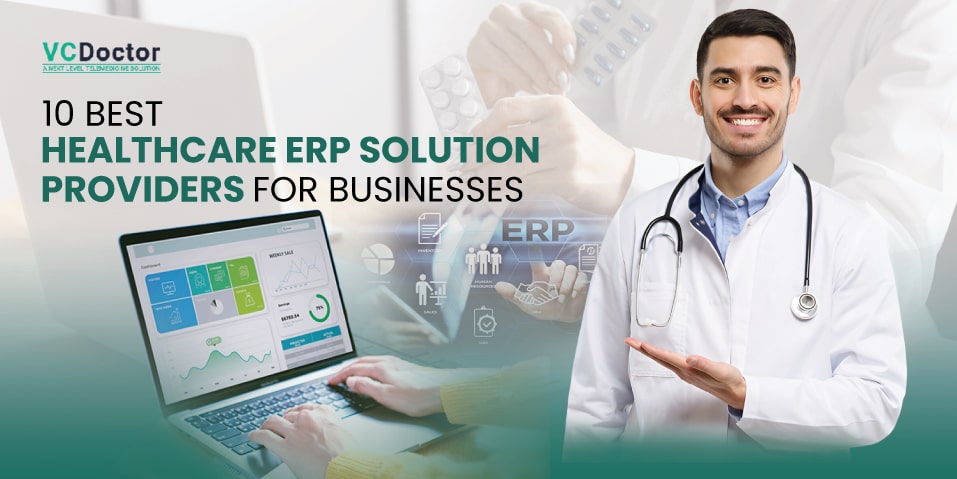10 Best Healthcare ERP Solution Providers for Businesses In 2024
In today’s time, the healthcare industry is evolving rapidly. Thus, the need for a robust and efficient ERP solution has become important. It is an integrated software platform responsible for performing various operational tasks, including financial management, client care and more. The advent of technology has transformed the healthcare industry through the seamless integration of different functions into a unified platform.
Through real-time data, a patient’s health can be improved. Thus, businesses are incorporating this technology rapidly to avail all benefits. If you belong to the healthcare sector wanting to reduce manual risk factors and errors, incorporating a healthcare ERP solution is a great idea. The implementation of ERP solutions is not easy. Therefore, you need an expert who can help you through the process.
Confused about whom to choose? We have got you covered. This article is a complete guide about the top healthcare ERP solution providers for business. Let us discuss the key features and benefits of the ERP system in the healthcare sector. So, without any further ado, here we go!
Table of Contents
- An Introduction To ERP Systems in the Healthcare Industry
- 10 Best Healthcare ERP Solution Providers for Businesses In 2024
- 6 ERP Key Features for the Healthcare Industry
- ERP Benefits for Healthcare Organizations
- How Does ERP System Work in the Healthcare Sector?
- Why Choose VCDoctor for ERP Solution?
- Wrapping Up!
- FAQs
An Introduction To ERP Systems in the Healthcare Industry
Enterprise resource planning plays a crucial role in the healthcare industry. It streamlines healthcare operations and promotes patient care. Additionally, it improves overall financial management. ERP healthcare software solutions are integrated software solutions which consolidate different functions like patient records, billing, inventory management, and human resources into a particular system. It reduces administrative burdens and promotes efficiency.
ERP systems provide healthcare experts complete patient care with real-time access to detailed patient data. It improves decision-making and promises continuous care. It also reduces the chances of medical risk factors and errors. That’s why it is used widely! A report states, an average of 6.2% growth is expected in the US healthcare ERP market between 2023 to 2030. The seamless integration of electronic health records (EHR) within ERP systems allows smooth patient data sharing between different healthcare departments. In all, ERP systems are evolving as an indispensable tool for modern healthcare organizations.
10 Best Healthcare ERP Solution Providers for Businesses In 2024
Here is a complete list of the top 10 best healthcare ERP solution providers you must consider for your business:
1. VCDoctor
VCDoctor is a one-stop ERP system solution provider in the healthcare sector, offering detailed practice management and telehealth solutions. The platform seamlessly integrates electronic health records and billing. It also integrates patient engagement and appointment scheduling. With its robust security features and user-friendly interfaces, VCDoctor helps healthcare providers optimize operations, maintain regulatory compliance, and boost overall efficiency.
2. DreamSoft4U
DreamSoft4U is a US-based firm renowned for building customized ERP software by developing these solutions either from scratch or by rebuilding the existing ones. The software is designed to meet the core business functionality like inventory and distribution management. It also includes accounting, production and more. They have a team of experienced professionals who use the latest technologies to deliver custom solutions that promise improved customer experience. So, if you have a specific need, experts at DreamSoft4U will cater to your requirements!
3. Epic
Regarded as one of the world’s largest ERP system companies, it is known for providing fully integrated EHR options. With more than 250 million patients using this system, Epic promotes revenue cycle and practice management. Over the years, Epic has been known for its comprehensive documentation and easy usage. Additionally, its customizable templates make it stand out! Some popular features of Epic are clinical decision support, electronic prescribing, and patient engagement tools. Comes with a user-friendly interface, and it allows patients to view records and communicate.
4. WebPT
Known for providing Cloud-based healthcare ERP solutions, WebPT is another popular solution provider designed mainly for healthcare organizations and physical therapy practices. The company offers different features, such as customizable templates, scheduling, billing, and clinical decision support. It is known for its excellent patient engagement tools like a patient portal and automated appointment reminders.
5. Cerner
Another prominent ERP and EHR software company is Cerner offering a wide range of healthcare solutions. Their ERP medical system primarily includes clinical decision support, order entry, medication management, and electronic prescribing. It is also popularly known for offering revenue cycle, practice management, and patient engagement tools. Comes with adjustable templates and patient portal access, so learning Cerner can be a task for newcomers. Additionally, its customer support is not up to the mark.
6. NextGen Healthcare
In the healthcare sector, NextGen Healthcare is a well-known company for ERP system solutions, providing integrated software solutions intended to improve clinical and financial operations. Patient interaction features, practice management, revenue cycle management, and electronic health records are all included in their platform. The solutions offered by NextGen Healthcare simplify administrative duties, enhance patient care, and guarantee regulatory compliance. Healthcare providers looking for complete ERP solutions can rely on them as reliable partners because of their user-friendly interface and strong support.
7. eClinicalWorks
eClinicalWorks is an ERP software solutions provider firm offering varied solutions for doctors and healthcare specialists such as EHR software, practice management software, and patient engagement tools. The company provides different software solutions, helping doctors to improve care management and overall operations. With complete data analytics and detailed information access, eClinicalWorks helps healthcare providers improve operational efficiency and reduce costs. They also deliver quality patient care.
8. Kareo
Kareo is a cloud-based ERP software system designed to meet the requirements of small healthcare organizations and private practice. The platform is known to provide access to different tools, helping healthcare companies to efficiently manage their patient’s billing. The platform is built so that it can be accessed by all and is highly intuitive. If you are a healthcare organization owner wanting to save money without compromising on quality, Kareo is the best option.
9. Practice Fusion
It is a prominent cloud-based electronic health record (EHR) platform supplier for medical ERP systems in the healthcare sector. Their solutions guarantee regulatory compliance and improve patient care. Practice Fusion’s capabilities, including automated scheduling and integrated billing. This facilitates effective management for healthcare providers. Practice Fusion is popularly known for its affordable and user-friendly interface. They help small to mid-sized practices by providing high-quality patient care and increase workflow efficiency.
10. AdvancedMD
It is an EHR software solution equipped with features such as electronic prescribing and patient scheduling. It comes with a simplified interface and is great for small and medium businesses. Their platform streamlines administrative tasks and enhances patient care. The robust analytics and automation capabilities help healthcare providers optimize workflows, improve financial performance, and deliver quality care.
6 ERP Key Features for the Healthcare Industry
Here are some key features of ERP systems in the healthcare industry:
1. Patient information management
Managing patient information in the healthcare industry is a prime feature of ERP systems. It includes safely storing a patient’s medical history and demographic information. Once you have easy access to this vital information, it improves patient management and overall care. Furthermore, it helps to reduce any risk factors or medical errors.
2. Appointment scheduling
When it comes to healthcare operations, appointment scheduling and management is a critical aspect that requires proper attention. Healthcare ERP systems feature robust appointment scheduling systems, allowing healthcare experts to schedule and manage appointments easily. It enhances patients’ satisfaction and reduces wait time.
3. Financial management
Healthcare ERP systems must have exceptional financial management capabilities such as general ledger, accounts receivable and accounts payable. This feature of the ERP systems helps healthcare businesses manage finances efficiently while reducing all risk factors.
4. Inventory management
Healthcare companies frequently have large inventories, which include equipment and medical supplies that need careful supply chain management. An inventory management system that can identify supply chain problems, manage orders, maintain inventory levels, and give real-time visibility into inventory status should be included in healthcare ERP systems.
5. Clinical documentation
A vital part of patient care and management is clinical documentation. A thorough clinical documentation system that enables healthcare personnel to quickly and conveniently document patient management and access patient data in real-time should be included in ERP healthcare systems.
6. Regulatory compliance and reporting
To guarantee patient safety and data security, healthcare institutions follow various legislation and standards. ERP systems provide extensive reporting and compliance capabilities that assist businesses in meeting legal obligations. The creation of comprehensive reports for regulatory submissions, audit trails, and automated record-keeping are some of these characteristics. ERP systems can be set up to automatically update in response to changing legislation, guaranteeing continued compliance.
ERP Benefits for Healthcare Organizations
Here are the top benefits of ERP systems in the healthcare organizations:
1. Improved patient care and safety
ERP systems integrate different departments to offer a centralized database that offers doctors real-time access to detailed patient information. This integration promotes excellent coordination amongst different departments, resulting in better patient care. Medical history and treatment plans are readily available, reducing the risk of medical errors and ensuring continuity of care.
2. Streamlined administrative process
Administrative burdens in healthcare organizations are quite common due to complex operations. The ERP system automates everyday tasks like patient scheduling and billing. This allows the staff to focus on improving patient care. Due to automation, the chances of human errors are reduced. Further, it enhances overall organizational efficiency and promotes accuracy. Through ERP systems, doctors can efficiently manage business operations while reducing administrative costs.
3. Improved financial management
Comprehensive financial management functionalities such as revenue cycle management and accounting are provided by ERP systems. These provide accurate and timely invoicing and minimize delays or errors. All this is done by automating billing and coding operations. They also offer updated financial data, which facilitates financial planning and strategic decision-making. Healthcare businesses can enhance their overall financial health by optimizing their income streams, cutting expenses, and improving cash flow through improved control over financial operations.
4. Optimized inventory management
Managing inventories in the healthcare industry is vital to ensure that there are enough medical supplies. These include medications and equipment. The ERP system in the healthcare industry keeps a real-time track of your inventory level and usage patterns. This visibility ensures there are no minimum stock outs or overstock situations. Through optimum management, healthcare organizations lower costs and reduce waste, ensuring supplies are always available for patients.
5. Regulatory compliance and reporting
Strict rules and guidelines must be followed by healthcare institutions. ERP systems ensure reliable record-keeping and make necessary documents easily accessible, which both contribute to compliance maintenance. The time and effort required for compliance management can be decreased by using these tools, which can produce comprehensive reports for audits and regulatory submissions. ERP providers maintain compliance with industry rules, avert fines, and preserve their reputation by offering a holistic perspective of operations.
6. Enhanced Data and Security
Sensitive patient data is handled by healthcare organizations. This data needs to be protected to preserve privacy and adhere to laws like HIPAA. ERP systems protect patient data with sophisticated security features like audit trails and access limits. ERP solutions lower the risk of data breaches and unauthorized access by centralizing data. ERP systems offer complete backup and disaster recovery options, guaranteeing that important data is kept safe in an emergency. Improved data security guarantees that healthcare providers may provide services without sacrificing patient privacy and builds patient trust.
How Does ERP System Work in the Healthcare Sector?
ERP systems in the healthcare sector promote various functions like patient records, billing, inventory, and human resources into a unified platform. It gives access to data in real time and streamlines business operations. This integration between the ERP system and the healthcare industry promotes coordinated care and improves decision-making. Through effective inventory management, ERP systems reduce waste and overall operational costs. Overall, ERP systems improve operational efficiency, optimize resource allocation, and enhance the quality of patient care, making them essential for modern healthcare management.
Why Choose VCDoctor for ERP Solution?
VCDoctor is an experienced ERP company solution provider in the healthcare industry. With the expertise of experienced professionals, they are delivering top-notch ERP solutions for enhanced patient experience. If you are looking to implement a healthcare ERP solution, look no further and choose VCDoctor! We have an experienced team who works with the latest technology to deliver quality solutions.
Looking for an end-to-end ERP solution for your healthcare?
Wrapping Up!
In the healthcare sector, ERP systems have evolved as essential as they offer access to the patient’s data in real-time. The widespread adoption of healthcare ERP solutions is due to its extensive features, streamlining operational expenses and promoting patient care. Today, small and large hospitals are adopting this technology to remain competitive in the industry.
FAQs
1. What is an enterprise healthcare system?
An enterprise healthcare system is an integrated electronic health record or EHR system which consolidates differences like billing, inventory and patient records. It promotes easy access and sharing of medical records; in addition to offering analytical insights into patient data supply chain management, enterprise healthcare systems also aid in enhancing the effectiveness and caliber of medical supply orders and healthcare delivery.
2. How should you choose the right ERP service providers?
Consider aspects like system integration capabilities and scalability when selecting top ERP vendors for the healthcare industry. Examine their experience in the healthcare industry, their capacity to address certain organizational needs, and the adaptability of their solutions to make sure they suit your operational objectives and specifications.
3. Are there disadvantages to using ERP solutions in the healthcare industry?
Yes, there are drawbacks to ERP solutions in the healthcare industry, such as significant implementation costs and the possibility of deployment disruptions. Therefore, it is important to choose experts for excellent services.
4. What are the key features of ERP in the healthcare industry?
Some popular features of an ERP in the healthcare industry are:
- Supply Chain Management
- HIPAA Compliance
- Automation & Flexibility
- Real-time Analytics
- Inventory Management
- Accounting & Mobility
- EHR (Electronic Health Records)
- Data management
- Finance Management
5. What is the cost of ERP system implementation in the healthcare sector?
Evaluating the cost of ERP in healthcare system implementation is difficult. In the software implementation, some major things included are licensing, implementation, and support. The average cost of the ERP system is between $5,000 to $20,000 or more.
6. Why do you need an integrated ERP system in healthcare organizations?
In the healthcare sector, an integrated ERP system centralizes data, optimizes workflows, boosts productivity for administrative and patient care duties, guarantees regulatory compliance, and strengthens financial management. Effective communication between departments is facilitated, errors are decreased, and vital information is accessed instantly, all of which contribute to an overall increase in organizational effectiveness.




